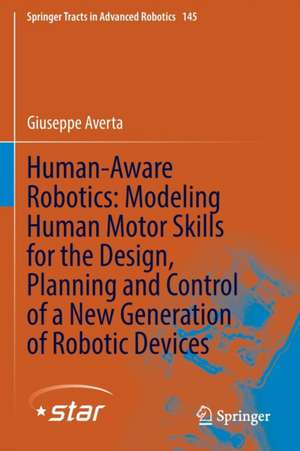Human-Aware Robotics: Modeling Human Motor Skills for the Design, Planning and Control of a New Generation of Robotic Devices: Springer Tracts in Advanced Robotics, cartea 145
Autor Giuseppe Avertaen Limba Engleză Paperback – 27 ian 2023
The content of this book is targeted to robotics and neuroscience enthusiasts, researchers and makers, students and simple lovers of the matter.
| Toate formatele și edițiile | Preț | Express |
|---|---|---|
| Paperback (1) | 889.92 lei 6-8 săpt. | |
| Springer International Publishing – 27 ian 2023 | 889.92 lei 6-8 săpt. | |
| Hardback (1) | 896.08 lei 6-8 săpt. | |
| Springer International Publishing – 26 ian 2022 | 896.08 lei 6-8 săpt. |
Din seria Springer Tracts in Advanced Robotics
- 18%
 Preț: 910.26 lei
Preț: 910.26 lei - 18%
 Preț: 893.71 lei
Preț: 893.71 lei -
 Preț: 445.98 lei
Preț: 445.98 lei -
 Preț: 406.43 lei
Preț: 406.43 lei -
 Preț: 523.44 lei
Preț: 523.44 lei - 17%
 Preț: 378.35 lei
Preț: 378.35 lei - 15%
 Preț: 640.88 lei
Preț: 640.88 lei - 18%
 Preț: 783.98 lei
Preț: 783.98 lei - 15%
 Preț: 641.74 lei
Preț: 641.74 lei - 15%
 Preț: 640.88 lei
Preț: 640.88 lei - 18%
 Preț: 994.72 lei
Preț: 994.72 lei - 18%
 Preț: 778.45 lei
Preț: 778.45 lei - 18%
 Preț: 730.35 lei
Preț: 730.35 lei - 18%
 Preț: 1233.83 lei
Preț: 1233.83 lei - 18%
 Preț: 951.47 lei
Preț: 951.47 lei - 15%
 Preț: 640.06 lei
Preț: 640.06 lei - 18%
 Preț: 1844.67 lei
Preț: 1844.67 lei - 15%
 Preț: 642.51 lei
Preț: 642.51 lei - 18%
 Preț: 1112.30 lei
Preț: 1112.30 lei - 15%
 Preț: 665.08 lei
Preț: 665.08 lei - 18%
 Preț: 947.85 lei
Preț: 947.85 lei - 15%
 Preț: 640.88 lei
Preț: 640.88 lei - 18%
 Preț: 776.88 lei
Preț: 776.88 lei - 18%
 Preț: 959.04 lei
Preț: 959.04 lei - 15%
 Preț: 659.02 lei
Preț: 659.02 lei - 15%
 Preț: 654.95 lei
Preț: 654.95 lei - 18%
 Preț: 973.38 lei
Preț: 973.38 lei - 5%
 Preț: 724.70 lei
Preț: 724.70 lei - 18%
 Preț: 981.49 lei
Preț: 981.49 lei - 18%
 Preț: 954.45 lei
Preț: 954.45 lei - 15%
 Preț: 641.53 lei
Preț: 641.53 lei - 15%
 Preț: 653.98 lei
Preț: 653.98 lei - 24%
 Preț: 814.81 lei
Preț: 814.81 lei - 18%
 Preț: 968.65 lei
Preț: 968.65 lei - 18%
 Preț: 970.70 lei
Preț: 970.70 lei
Preț: 889.92 lei
Preț vechi: 1085.26 lei
-18% Nou
Puncte Express: 1335
Preț estimativ în valută:
170.30€ • 176.72$ • 142.35£
170.30€ • 176.72$ • 142.35£
Carte tipărită la comandă
Livrare economică 17-31 martie
Preluare comenzi: 021 569.72.76
Specificații
ISBN-13: 9783030925239
ISBN-10: 3030925234
Pagini: 276
Ilustrații: XVI, 276 p. 130 illus., 121 illus. in color.
Dimensiuni: 155 x 235 mm
Greutate: 0.41 kg
Ediția:1st ed. 2022
Editura: Springer International Publishing
Colecția Springer
Seria Springer Tracts in Advanced Robotics
Locul publicării:Cham, Switzerland
ISBN-10: 3030925234
Pagini: 276
Ilustrații: XVI, 276 p. 130 illus., 121 illus. in color.
Dimensiuni: 155 x 235 mm
Greutate: 0.41 kg
Ediția:1st ed. 2022
Editura: Springer International Publishing
Colecția Springer
Seria Springer Tracts in Advanced Robotics
Locul publicării:Cham, Switzerland
Cuprins
Introduction.- Part I: Taming the Complexity of Human Motion Generation.- Understanding the Principal Modes of Natural Movements in Temporal Domain.- Quantifying the Time-Invariance Properties of Upper Limb Synergies.- Evidences on the Hierarchical Control of Human Hands.- Part II: On the Design of Nature-Inspired Prostheses and the Assessment of Motion Impairment.- Using Nature-Inspired Principles to Design of Robotic Limbs: the Soft Wrist.- A Novel Approach to Quantify Motion Impairment.- A novel mechatronic system for evaluating elbow muscular spasticity relying on Tonic Stretch Reflex Threshold estimation.- Part III: Transferring Human Principles to Cobots and Autonomous Robots.- Natural Motion: Embedding Human-Likeliness in Robot Movements.- A Focus on Motion Dynamics: Planning Impedance Behaviors in Physical Interaction.- Learning from Humans How to Grasp: a Reactive-Based Approach.- Learning from Humans How to Grasp: Enhancing the Reaching Strategy.- Learning to prevent grasp failure with soft hands: from on-line prediction to dual-arm grasp recovery.- Dexterity Augmentation of Robotic Hands: a Study on the Kinetic Domain.- Exploiting Principal Components for Robots Walking: an Approach for Sub-Optimal Locomotion.- Conclusions and Lessons Learned.
Textul de pe ultima copertă
This book moves from a thorough investigation of human capabilities during movements and interactions with objects and environment and translates those principles into the design planning and control of innovative mechatronic systems, providing significant advancements in the fields of human–robot interaction, autonomous robots, prosthetics and assistive devices. The work presented in this monograph is characterized by a significant paradigmatic shift with respect to typical approaches, as it always place the human at the center of the technology developed, and the human represents the starting point and the actual beneficiary of the developed solutions.
The content of this book is targeted to robotics and neuroscience enthusiasts, researchers and makers, students and simple lovers of the matter.
The content of this book is targeted to robotics and neuroscience enthusiasts, researchers and makers, students and simple lovers of the matter.
Caracteristici
Develops and test mathematical descriptors of human motor control Proposes a trans-disciplinary approach to bridge the gap between the artificial and the natural Unveils the main patters that can be used to simplify its codification
